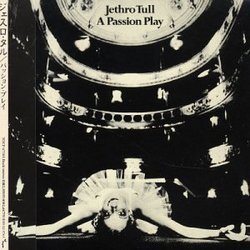| All Artists: Jethro Tull Title: Passion Play Members Wishing: 1 Total Copies: 0 Label: Toshiba EMI Release Date: 6/17/2003 Album Type: Import, Original recording remastered Genres: Rock, Classic Rock, Metal Styles: Progressive, Progressive Rock, Album-Oriented Rock (AOR) Number of Discs: 1 SwapaCD Credits: 1 UPC: 4988006812628 |
Search - Jethro Tull :: Passion Play
 | Jethro Tull Passion Play Genres: Rock, Classic Rock, Metal
Japanese remastered reissue of 1973 album, that's unavailable domestically, packaged in a limited edition miniature LP gatefold sleeve features 3 tracks including one bonus enhanced video track, 'The Story Of The Hare Who ... more » |
Larger Image |
CD DetailsSynopsis
Album Description Japanese remastered reissue of 1973 album, that's unavailable domestically, packaged in a limited edition miniature LP gatefold sleeve features 3 tracks including one bonus enhanced video track, 'The Story Of The Hare Who Lost His Spectacles'. Toshiba-EMI Similar CDs
|
CD ReviewsProgressive, Experimental and Artistic Tull Lonnie E. Holder | Columbus, Indiana, United States | 08/28/2006 (5 out of 5 stars) "Many critics initially reviled this album when it first appeared in 1973, though Tull fans loved it so much that it went to number one on the charts. With time better explanations of the music exist, and music has evolved to the point where the music of "A Passion Play" has achieved a better perspective. However, the music and the composition, confusing as it may initially appear, allows you to recognize that this was an attempt to create an epic and eclectic work. In some ways the work is unfinished, because the original studio sessions stopped before the original concept was completed, and thus Jethro Tull had to cut three albums sides of material to two. Some of the music originally intended for this album appeared on later albums; one example is "Skating Away on the Thin Ice of a New Day," which eventually appeared in "Warchild."
The album was intended to tell the story of a recently-deceased man seeing his own funeral, and his journey in the afterlife, including purgatory and hell, and eventual reincarnation. In addition to this primary story was the inclusion of "The Story of the Hare Who Lost His Spectacles," a story likened to stories from Winnie the Pooh to Peter and the Wolf. "A Passion Play" combines ten tracks into a single work (according to the official Jethro Tull web site). As in "Thick as a Brick," there is an occasional uneven spot in the transition from one track to the next. However, as in the earlier album, the transitions and concept works nearly as well. The music is certainly well refined, with hard-driving rock riffs, drums and synthesizers keeping Jethro Tull at the more experimental, progressive edge of rock. I warn you, though, that the music requires a good sound system to be able to listen to music that extends from very quiet to very loud. I compare this music to classical music, which similarly has sounds that extend from soft to loud and also requires a good sound system. I also warn you to attempt to understand the lyrics at your own peril. The lyrics verge on the incomprehensible, even for those who have studied them at length. The lyrics are poetic and symbolic, and attempt to describe events and concepts barely attainable by the human mind, much less by a human language. Music such as this does not attempt to pander to a "style" or to commercial success. This music is art. Thus, a listener should interpret the meaning, significance and relevance of the music individually. I will not pretend to tell you that I understand this work in its entirety. Perhaps Jethro Tull never intended for listeners to understand the music, in the manner of Yes's "Tales from Topographic Oceans." Note that this version of "A Passion Play" is a Japanese remastered release of the original 1973 album. This version includes an enhanced video track of "The Story of the Hare Who Lost His Spectacles." While the video is nice to have, the cost of this CD is significantly greater than the cost of a U.S. release without the video. I recommend purchasing the U.S. release and then buying a Jethro Tull DVD, or several, given the price difference. While I may not be able to define or understand progressive rock, I know it when I hear it, and this music is definitely progressive rock. Listen to this music only if you are prepared to be open-minded and to accept it for what Jethro Tull and Ian Anderson attempted to do, and not for the misguided interpretations of those who think they have the divine ability to judge the work of an artist as trash. Enjoy! " |

 Track Listings (2) - Disc #1
Track Listings (2) - Disc #1

